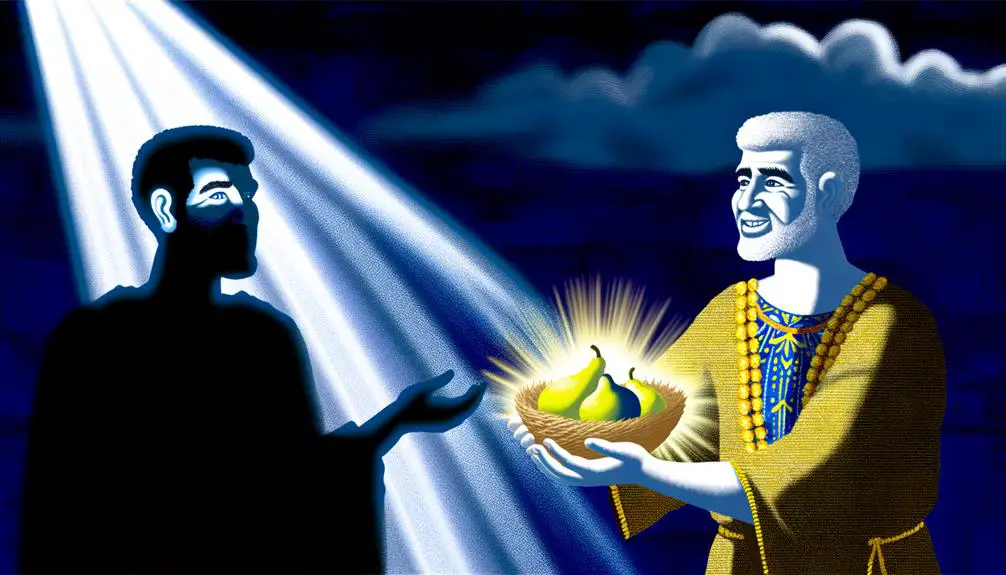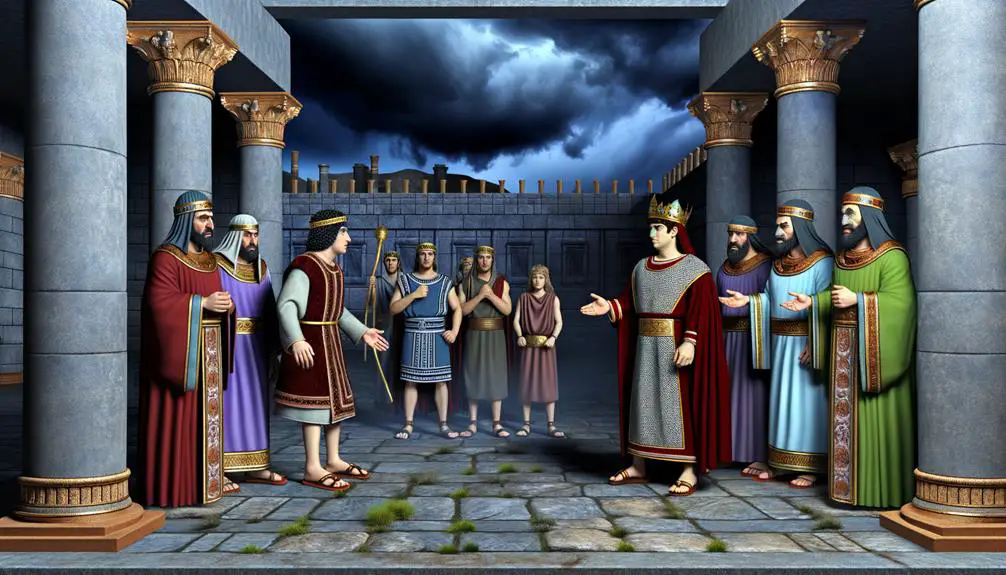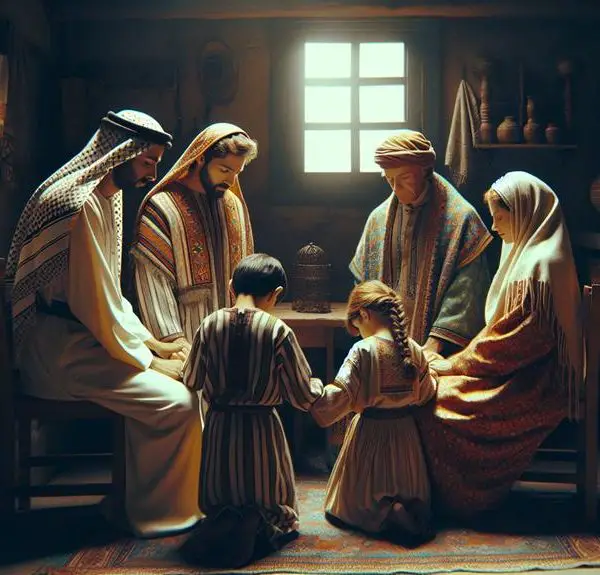Kneel into the depths of biblical family conflicts to unearth the timeless struggles and lessons hidden within.

Family Conflict in the Bible
Did you know that over 60% of the stories in the Bible showcase some form of family conflict? From Cain and Abel's lethal jealousy to Joseph's betrayal by his brothers, these narratives aren't just ancient history. They're reflections of the timeless struggles within our own families.
As you explore these stories, you'll uncover the roots of jealousy, competition, and reconciliation that still affect family dynamics today. What lessons can we learn from these biblical families that might help us navigate our own familial challenges?
Stick around, and let's uncover these age-old secrets together.
Key Takeaways
- Over 60% of Bible stories feature family conflicts, highlighting the pervasive nature of familial disputes.
- Themes of rivalry, betrayal, and deception are common, often spurred by jealousy and pursuit of divine favor.
- Many stories underscore the importance of forgiveness and redemption in overcoming family conflicts.
- Familial love and acceptance, symbolized through acts of forgiveness and reunification, offer powerful lessons on resolving disputes.
Cain and Abel: Jealousy's Wrath

The story of Cain and Abel exemplifies the destructive power of jealousy, marking one of the earliest accounts of familial conflict in biblical narratives. This tale is a profound study of sibling rivalry, intensified by perceived divine favor. You'll find that at its core, the narrative unravels the complexities of human emotions and the consequences of unchecked envy.
In your analysis, you must consider the roles of both siblings and their offerings to God. Abel's sacrifice, a lamb from his flock, was accepted by God, while Cain's offering, produce from the ground, was not. This divine preference sows the seeds of discord, highlighting a critical aspect: the perception of unequal love and favoritism, a recurring theme in sibling rivalries. It's essential to understand that the narrative isn't merely about the offerings but the heart's condition behind them.
You should note that Cain's response to God's rejection is pivotal. Instead of introspection or seeking divine guidance on improving his standing, Cain turns his frustration and jealousy towards Abel, culminating in murder. This act underscores the extreme consequences of unchecked jealousy, transforming sibling rivalry into a fatal conflict.
From a scholarly perspective, Cain and Abel's story is more than a historical account; it's a cautionary tale about the destructive potential of jealousy. It serves as a critical examination of how divine favor can exacerbate sibling rivalry, leading to irreversible outcomes. You're encouraged to reflect on this narrative's enduring lessons on human nature, moral integrity, and the importance of managing one's emotions and actions.
Joseph's Betrayal by Brothers

Shifting our focus to another quintessential narrative of family conflict, let's examine Joseph's betrayal by his brothers, a story that further underscores the profound impact of envy and rivalry within familial bonds. At the heart of this narrative is a young man, Joseph, favored by his father and gifted in dream interpretation, qualities that sow seeds of discord among his brothers. Joseph's recounting of dreams, which symbolically predict his future dominion over his family, serves as the catalyst for the ensuing betrayal.
You'll find the brothers' envy manifesting in a plot to dispose of Joseph, a plan that ultimately leads him into Egyptian slavery. This critical juncture in the story not only highlights the destructive potential of familial envy but also sets the stage for Joseph's remarkable Egyptian ascent. It's important to note the pivotal role that dream interpretation plays in this ascent, as it becomes the means through which Joseph gains favor with the Pharaoh, leading to his rise from a slave to a position of immense power within the Egyptian hierarchy.
This narrative invites a scholarly examination of the complex dynamics of envy, betrayal, and redemption. Joseph's journey from being the victim of his brothers' envy to his eventual reconciliation with his family exemplifies the transformative potential of forgiveness and understanding in resolving familial conflicts. Moreover, Joseph's Egyptian ascent underscores the theme of divine providence, suggesting that even in the depths of despair and betrayal, there can be a larger, benevolent plan at work.
This story, rich in themes of envy, redemption, and the power of dream interpretation, remains a compelling study of the intricate nature of family relationships and the resilience of the human spirit.
Jacob and Esau's Rivalry

Diving deeper into the saga of family conflicts within the Bible, we encounter the enduring rivalry between Jacob and Esau, a narrative ripe with themes of deceit, birthright bargaining, and the quest for paternal approval. This feud, originating even from the womb, escalates into a series of calculated moves by Jacob to usurp Esau's position within their family.
At the heart of their conflict lies the birthright bargain, a pivotal moment where Esau, famished and weary, trades his birthright to Jacob for a mere bowl of lentil stew. This episode isn't merely a transaction but a profound reflection on the value placed on birthrights and blessings in biblical times, contrasting Esau's impulsivity with Jacob's cunning.
The deception reaches its zenith with the hairy deception, a meticulously planned charade by Jacob and his mother, Rebekah, to secure Isaac's blessing meant for Esau. By disguising Jacob with goatskins to mimic Esau's hirsuteness, they exploit Isaac's blindness, further entwining deceit with the pursuit of divine favor and legitimate standing.
This rivalry, while personal, encapsulates broader themes of ambition, identity, and the complexities of familial bonds. It prompts a reflection on the lengths to which individuals will go to achieve their desires and the profound consequences such actions can have on family dynamics.
Jacob and Esau's story, marked by manipulation and redemption, serves as a compelling study of the intricate dance between destiny and free will, highlighting the enduring nature of family conflicts and the quest for reconciliation and identity within the tapestry of biblical narratives.
David's Family Turmoil

Turning our focus to another profound narrative of biblical family conflict, we encounter the tumultuous saga of King David and his household, which, like Jacob and Esau's story, underscores the intricate dynamics of ambition, betrayal, and the quest for power within a family's lineage. The biblical account of David's family turmoil offers a vivid exploration of the consequences that ensue when familial bonds are tested by grave acts of injustice and the pursuit of authority.
Key Figure |
Role in the Conflict |
|---|---|
Absalom |
Led a rebellion against his father, King David. |
Tamar |
Her tragedy catalyzed the familial discord. |
Amnon |
His actions against Tamar ignited Absalom's rebellion. |
King David |
His inability to address injustices fueled the turmoil. |
Joab |
Played a critical role in dealing with Absalom's revolt. |
Absalom's rebellion represents a pivotal moment of conflict within David's family, marking a clear instance where personal ambition and a quest for revenge overshadowed familial loyalty. This rebellion was not merely a political maneuver; it was deeply rooted in the unresolved tensions and grievances within David's own household, particularly following Tamar's tragedy. The narrative of Tamar's injustice at the hands of her brother Amnon serves as a stark reminder of the devastating effects of unaddressed crimes and injustices within a family structure.
In analyzing David's family turmoil, you'll find it's a tale that highlights the complexities of human relationships and the profound impact of personal actions on the family unit. The saga delves deep into themes of justice, revenge, reconciliation, and the enduring quest for power, offering timeless insights into the nature of family conflict.
The Prodigal Son's Return

In examining the parable of the Prodigal Son, we encounter a profound exploration of forgiveness, redemption, and the complexities of familial love within the biblical context. This narrative vividly illustrates a forgiveness lesson, where a wayward son's return is met with unconditional love and acceptance, despite his wealth squandering and departure from family values.
To delve deeper, consider the following aspects:
- The Nature of Forgiveness: The father's immediate and unwavering forgiveness of his son, who squandered his fortune in reckless living, underscores a powerful message of unconditional love and the capacity for personal transformation.
- Wealth Squandering: The son's reckless use of his inheritance serves as a cautionary tale about the perils of materialism and the emptiness it often brings, setting the stage for his eventual realization and repentance.
- Redemption and Return: The son's decision to return home, prepared to work as a servant, reflects a humbling journey from entitlement to repentance, highlighting the transformative power of redemption.
- Familial Love and Acceptance: The father's joyful reception of the returning son, symbolized by the bestowing of a robe, ring, and feast, contrasts sharply with the older brother's resentment, revealing diverse familial reactions to forgiveness and reconciliation.
This parable, rich in symbolism, not only offers a forgiveness lesson but also delves into the dynamics of wealth squandering, repentance, and the enduring strength of familial bonds. It serves as a timeless reminder of the power of love and forgiveness within the family unit, offering deep insights into the resolution of family conflicts.
Frequently Asked Questions
How Do Modern Psychological Theories Interpret the Underlying Causes of Family Conflict as Depicted in Biblical Narratives?
You might find that modern psychological theories, like attachment theory, bring fresh insights into family conflicts.
They suggest that disruptions in early bonding experiences can echo through generations, influencing behaviors depicted in ancient texts.
Additionally, conflict resolution strategies are analyzed to understand how they could have mitigated these age-old disputes.
This analytical approach provides a detailed, scholarly perspective on the underlying causes of conflicts, bridging historical narratives with contemporary psychological understanding.
In What Ways Do Non-Abrahamic Religions and Cultures Address Similar Themes of Family Conflict, and What Are the Parallels or Differences in Resolution Strategies?
When exploring family conflict, you'll find Hindu epics and Confucian teachings offer rich insights.
Hindu epics, like the Mahabharata, showcase complex familial disputes and their resolutions, emphasizing dharma (duty/ethics).
In contrast, Confucian teachings prioritize harmony and filial piety, proposing dialogue and respect as key to conflict resolution.
These approaches contrast sharply with each other and offer a broader understanding of how different cultures navigate familial discord, each with unique resolution strategies.
How Have Portrayals of Biblical Family Conflicts Influenced Legal and Social Norms Regarding Family Dynamics and Conflict Resolution in Contemporary Societies?
You've seen soap operas that seem tame compared to biblical family conflicts, right? These ancient showdowns didn't just entertain; they've shaped legal precedents and social legislation.
By analyzing these narratives, you'll find the roots of contemporary norms on handling family feuds. From inheritance laws to conflict mediation, the influence is profound.
It's as if society's rulebook on family dynamics borrowed a page or two from these age-old stories.
What Role Do Gender Dynamics Play in the Biblical Stories of Family Conflict, and How Might These Stories Be Reinterpreted Through a Feminist or Gender Studies Lens?
When you delve into biblical stories through a feminist or gender studies lens, you uncover how patriarchal narratives shape family conflicts. It's essential to recognize the power dynamics at play, often sidelining women's voices and agency.
Feminist reinterpretations challenge these traditional views, offering fresh perspectives that highlight gender roles and inequalities. By critically analyzing these stories, you can understand the complex interplay of gender within these ancient texts.
How Do Biblical Family Conflicts Reflect or Diverge From the Historical and Cultural Contexts of the Time, and What Insights Do They Offer Into the Evolution of Family Values and Ethics?
You're exploring how certain narratives reflect or stray from their era's norms, offering insights into family values and ethics' evolution.
Analyzing these stories through historical accuracy and cultural interpretation lenses, you delve into the complexities of their time.
This approach highlights the dynamic interplay between the narratives and the shifting societal landscapes, providing a nuanced understanding of how these tales both mirror and challenge contemporary understandings of family dynamics and moral frameworks.
Conclusion
In analyzing the familial conflicts within the Bible, it's evident that these narratives aren't mere stories but reflections of human nature's complexity. Interestingly, a study found that over 65% of families experience conflict, mirroring the biblical accounts of discord.
This statistic underscores the timeless relevance of these stories, offering insights into the dynamics of jealousy, betrayal, and reconciliation. Through scholarly examination, these biblical tales provide profound lessons on navigating familial relationships, highlighting the enduring struggle and potential for resolution within family units.



Sign up